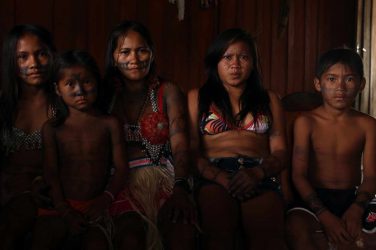According to Brazil’s Justice Minister Nelson Jobim, a new government decree is
a way to guarantee that the Indians keep their already-conquered territory. But
Indian rights groups and the Brazilian Indians themselves are against the new
legislation and accuse Jobim of turning the clock back on their rights to jungle lands.
During the last constitutional revision in 1988, the Brazilian Congress incorporated Article 231 to recognize
the inalienable right of indigenous people to their ancestral lands and natural resources, guaranteeing their right to exist
as distinct cultures. 1991’s Decree 22 strengthened the language of the Constitution by further delineating the primacy
of indigenous rights over competing interests, thereby enforcing the demarcation of indigenous reserves based on
aboriginal habitation. The Government stated that all 554 indigenous territories should be demarcated by October 5, 1993. To
date, only 210 indigenous land titles have been granted.
A new decree signed by President Fernando Henrique Cardoso on January 8, 1996, however, signals a major
step backwards for indigenous rights in Brazil, according to Brazilian and international indigenous rights groups. Decree
1775, these groups contend, impedes indigenous peoples’ rights as guaranteed by the 1988 Constitution, compromising
the already slow process of establishing indigenous reserves by permitting commercial interests to challenge the
demarcation of indigenous lands.
Beto Borges, Amazon Campaign Coordinator
for the Rainforest Action Network, a San Francisco based organization,
states, “Decree 1775 delays the demarcation of new indigenous reserves,
and challenges the legitimacy of existing ones.”
Decree 22 enforced the demarcation of indigenous lands without allowing conflicting interests to appeal, but
provided compensation to parties who already possessed legal title to these indigenous lands. Decree 1775 reverses the tenets
of Decree 22 by allowing commercial interests to challenge the process of demarcation of indigenous lands. The new
decree effectively permits invaders, such as ranchers, loggers, and miners the opportunity to contest the demarcation process
in a given area. Economic interests may now legally take the natural resources out of the control of indigenous
groups, thereby undermining the rights of indigenous people to their traditional lands as recognized in Article 231 of the
Brazilian Constitution.
The new decree states that previously demarcated areas which are not yet fully registered are open to
revision, including Yanomami territories. Yanomami peoples are preoccupied that political and economic interests are working
to annul indigenous land rights. The Yanomami fear continued invasions of their lands by miners who destroy and
pollute
their rivers. Since 1987, the Yanomami population has been reduced by 25%. With the signing of Decree 1775,
the international community fears the Yanomami population will decline even further.
Struggles by indigenous groups to retain their natural resources and the land itself are expected to arise.
CIMI (Indigenist Missionary Council) cites that eight indigenous areas have already been invaded in the few weeks
since the new decree became law.
Due to political and economic pressures, Minister of Justice, Nelson Jobim has been trying to revoke Decree
22 since 1991. Jobim argues that Decree 22 does not provide
direito do contraditório, or “the right to contest,”
on behalf of private economic interests. Decree 22 was ruled unconstitutional because it does not incorporate
the adversarial process. The new decree, which effectively annuls Decree 22 may be used to benefit economic
interests who have expressed their desire to capitalize upon Amazonian resources.
The only indigenous areas immune from possible review are the 210 fully demarcated and registered lands.
The remaining 344 territories, which have been demarcated but not fully registered, are open to review, and will
most probably be reduced. Such a revision in policy threatens to stall the future demarcation of indigenous territories
in Brazil for years to come. The government states the demarcation process will continue, yet the Brazilian state
has effectively paralyzed the demarcation process.
The first appeal has already been registered by Agropecuária Sattin, S.A., located in the state of Mato
Grosso, who are contesting the Guarani-Kaiowa territory of Sete Cerros. It is feared that escalating violence in this
region will bring about an increase in the number of suicides by the Guarani peoples.
The National Indian Foundation (FUNAI) is responsible for registering land titles of demarcated areas.
FUNAI is the administrative office scheduled to handle the appeals process, yet this office is not sufficiently equipped
to deal with the gigantic demand that will be placed upon them from all of the new appeals. Within the G7 (Group
of Seven) Pilot Project to Conserve the Brazilian Rainforests, $9.7 million have been earmarked by the G7 to
be directed toward the demarcation of indigenous lands in Brazil. The international community fears G7 moneys
will be misdirected toward the revision process, clearly not what the G7 funds were allocated for. Indigenous
groups are asking the German government, the principal financial donor to the G7, to temporarily halt disbursements
so these funds are not misdirected.
The international community fears Decree 1775 will facilitate the new model of privatization
currently underway in the Brazilian Amazon. In rewriting Brazilian law, the government is making it legally possible
for firms to invade indigenous lands for the purpose of cattle ranching, oil, mineral, and mahogany extraction.
These types of unsustainable forest practices historically facilitate infrastructure development, thereby opening up
remote and often pristine areas of forest which have long been considered the sacred lands of numerous indigenous peoples.
The consensus from Brazilian indigenous, and organizations supporting indigenous rights, argue that the
FHC government should be held accountable for their actions. The international community is calling upon FHC
to revoke Decree 1775 and reinstate indigenous rights to land title. The cultural survival of hundreds of
indigenous groups throughout Brazil are in danger of extinction, they argue. Alarmed by the seriousness of human
rights violations in Brazil, the Organization of American States (OAS) is in the process of writing an official report to
the Government of Brazil encouraging the state to respect the international human rights to which Brazil is a signatory.
The Amazon Coalition, a group of US-based non-governmental organizations (NGOs) working on
environmental and human rights issues in the Amazon, recently met in San Francisco to discuss the serious implications
of Decree 1775. The Amazon Coalition has jointly sent a letter to President Fernando Henrique Cardoso urging
him to revoke Decree 1775.











